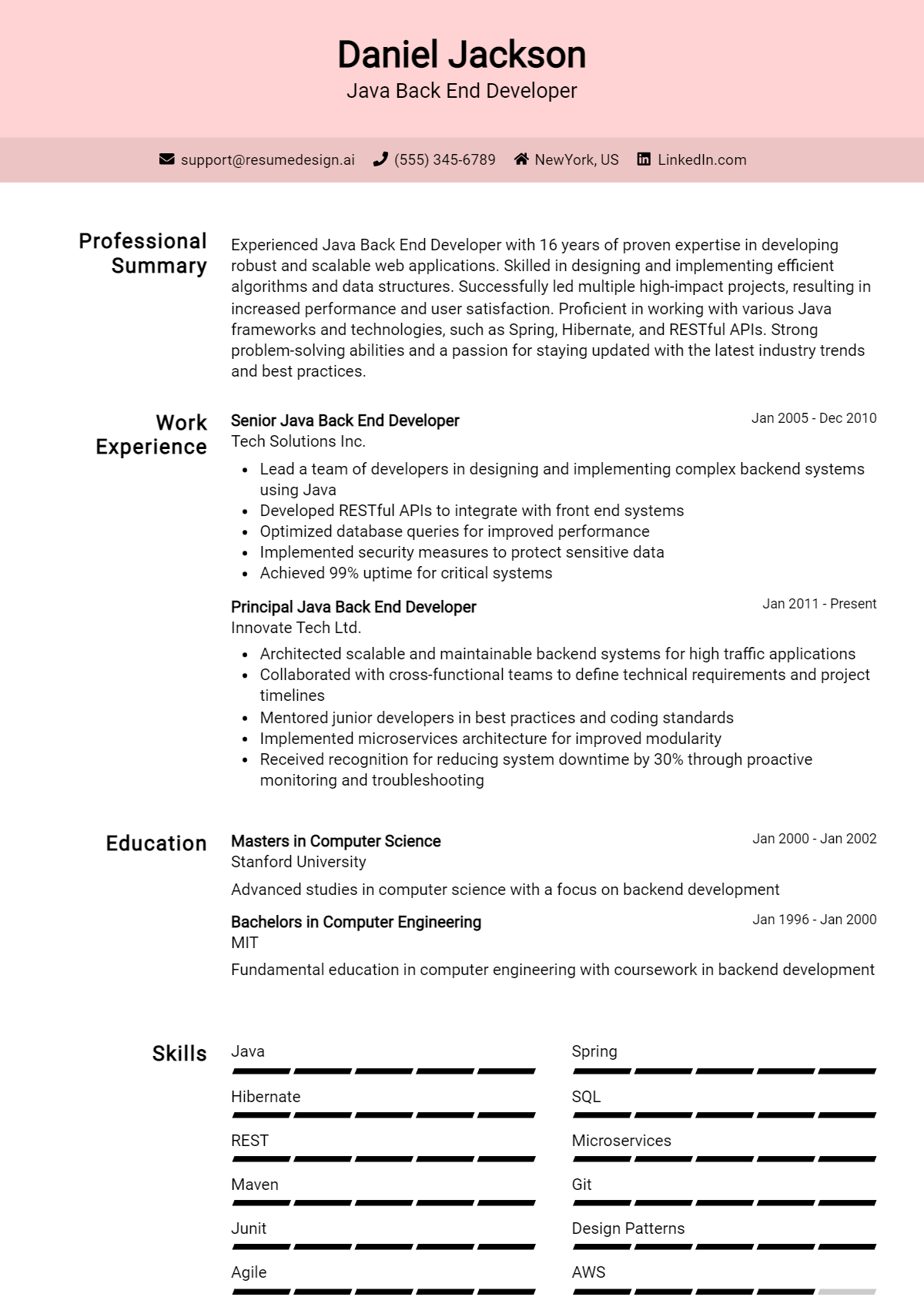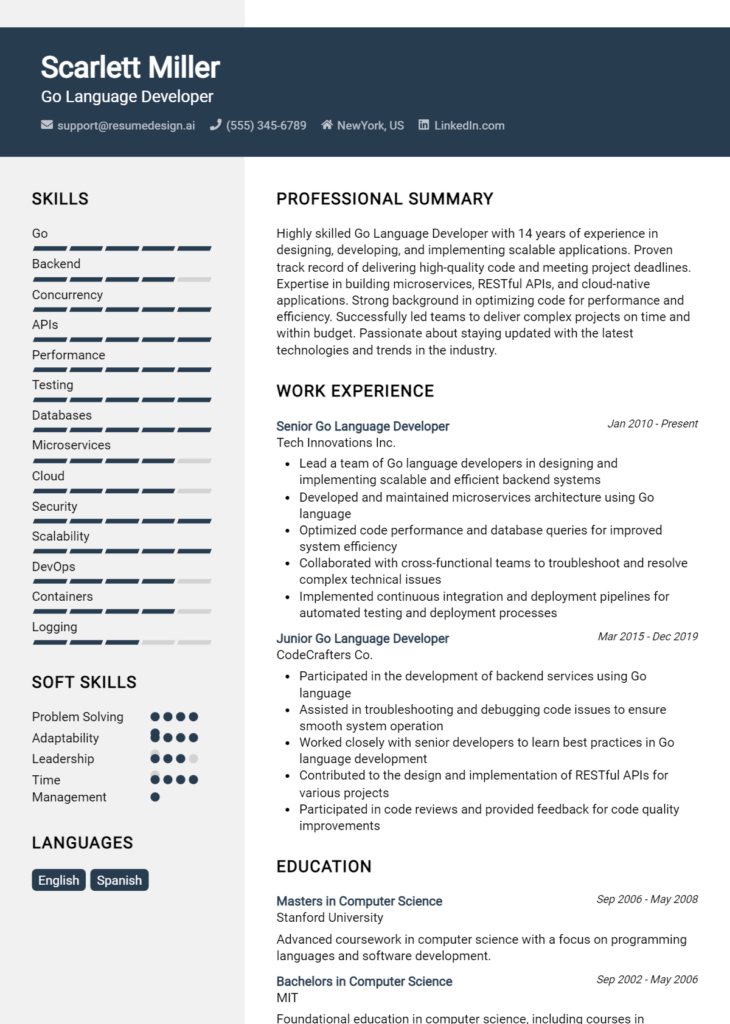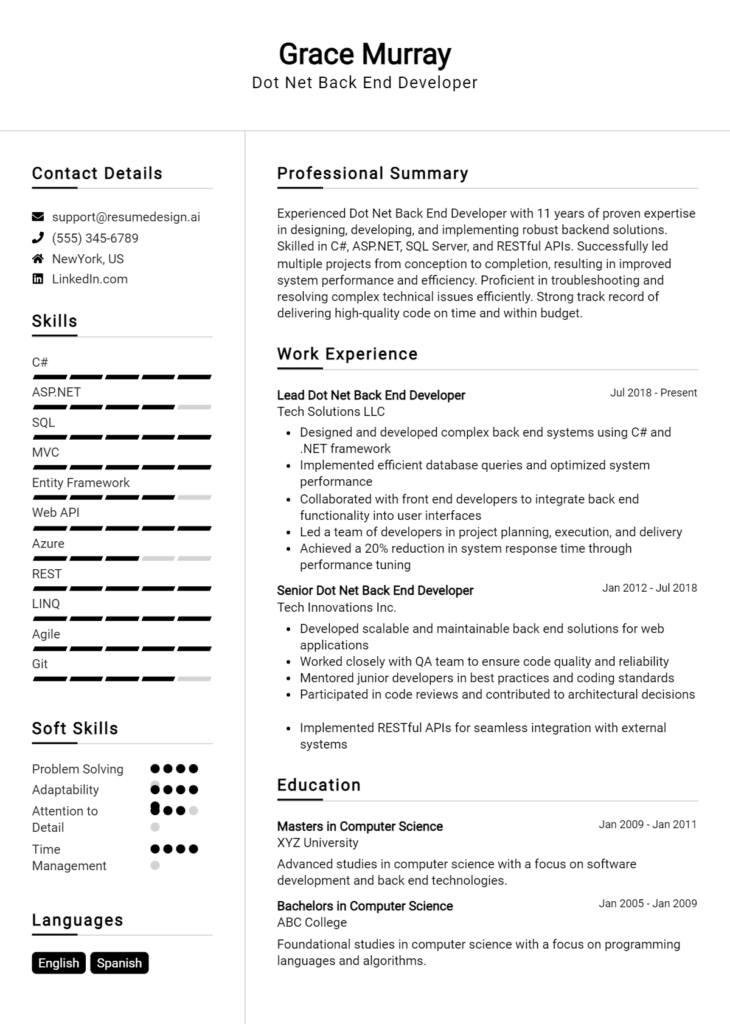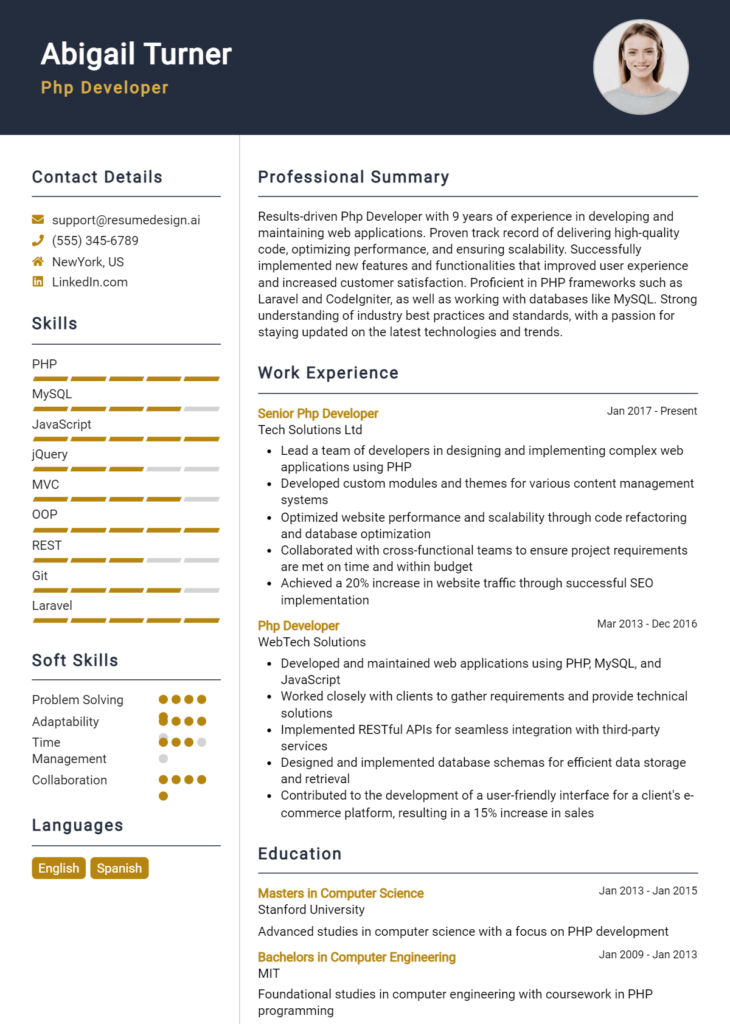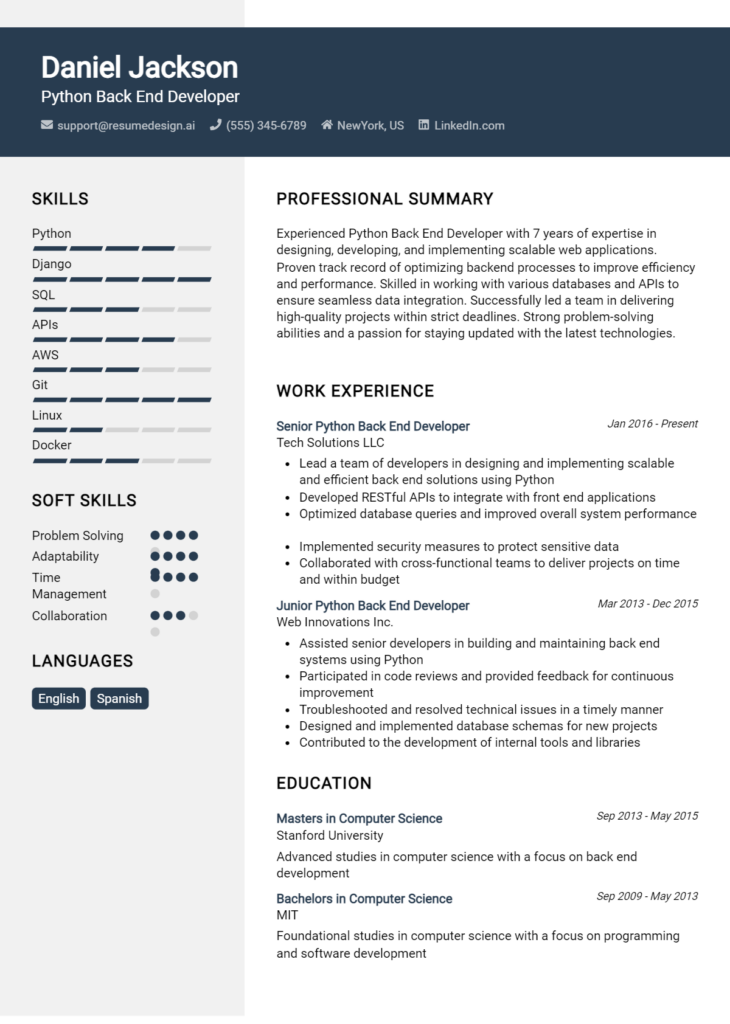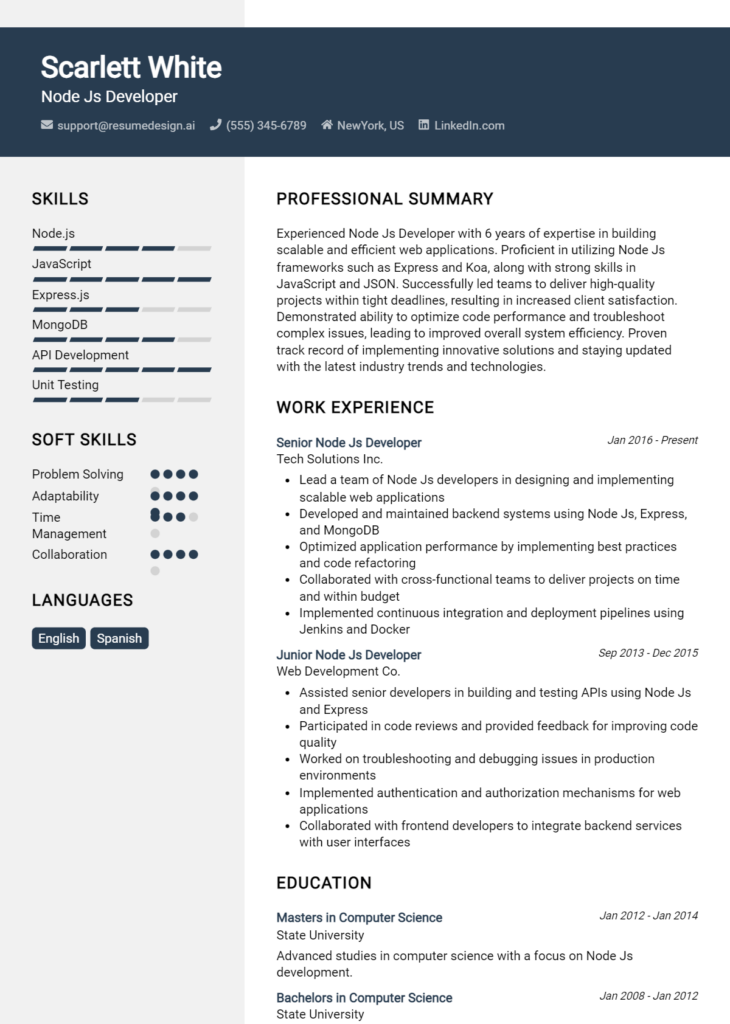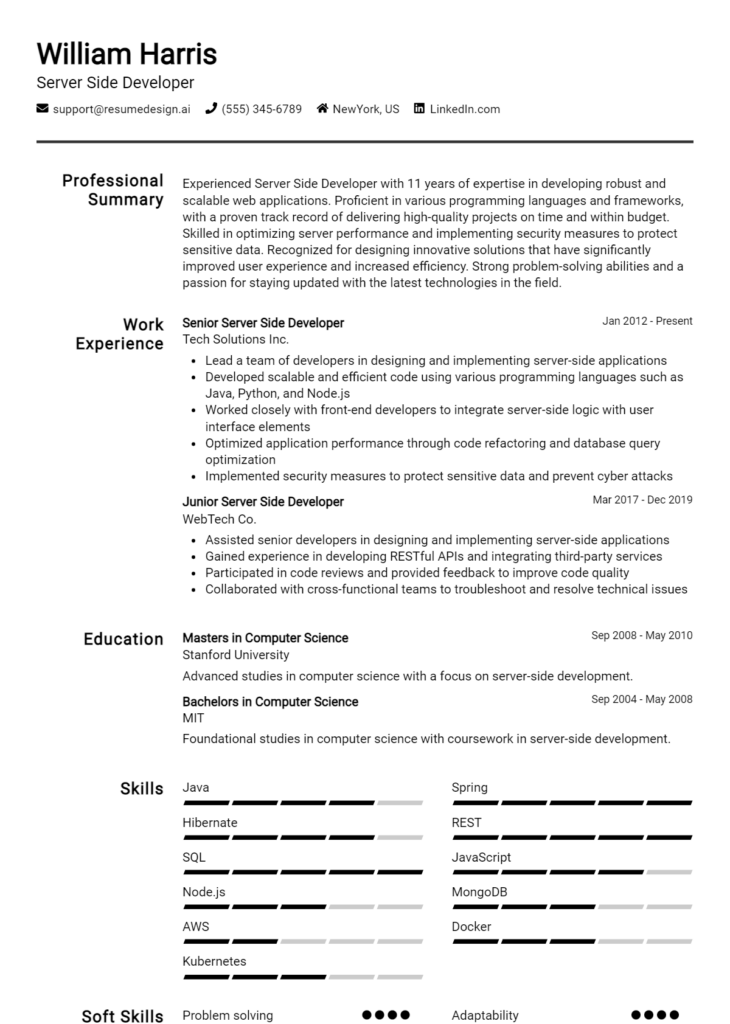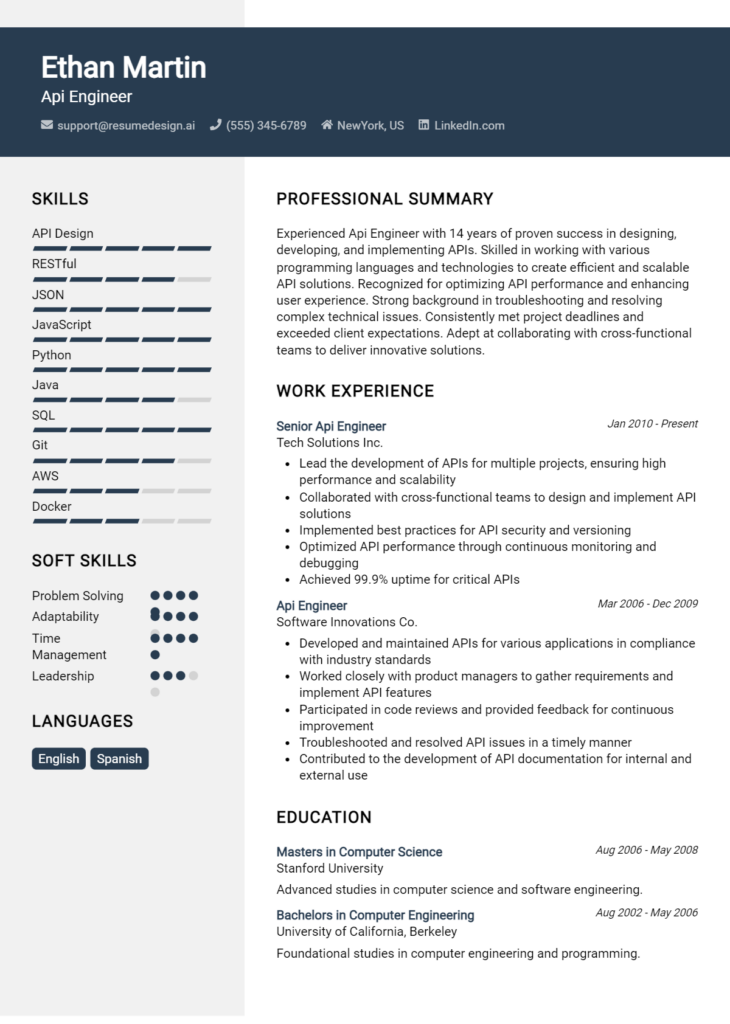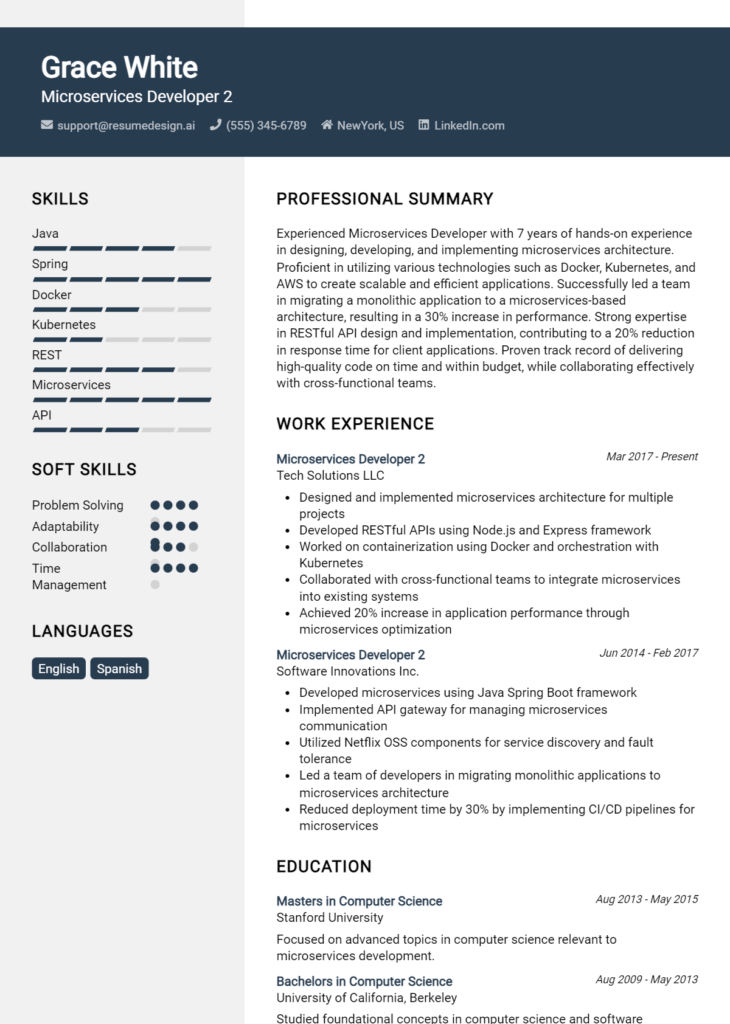Java Back-End Developer Core Responsibilities
A Java Back-End Developer plays a pivotal role in creating and maintaining server-side applications and services. Key responsibilities include designing robust APIs, optimizing database interactions, and ensuring seamless integration with front-end components. This role requires strong technical skills in Java, problem-solving abilities, and operational know-how to collaborate effectively across departments such as product management and user experience. A well-crafted resume highlighting these qualifications can significantly enhance an applicant's chances of contributing to the organization’s success and overall objectives.
Common Responsibilities Listed on Java Back-End Developer Resume
- Develop and maintain scalable server-side applications using Java.
- Design and implement RESTful APIs for front-end integration.
- Optimize database performance and manage data storage solutions.
- Collaborate with front-end developers to ensure seamless application functionality.
- Participate in code reviews and maintain coding standards.
- Debug and troubleshoot issues in existing applications.
- Implement security measures and data protection protocols.
- Write unit tests and conduct performance testing for applications.
- Document application processes and technical specifications.
- Stay updated with the latest industry trends and technologies.
- Engage in agile development methodologies and participate in daily stand-ups.
High-Level Resume Tips for Java Back-End Developer Professionals
In today's competitive job market, a well-crafted resume serves as a vital tool for Java Back-End Developer professionals looking to make a strong first impression on potential employers. Your resume is often the first glimpse a hiring manager gets of your skills, experience, and achievements, making it crucial that it effectively communicates your technical expertise and professional accomplishments. A polished resume not only showcases your qualifications but also reflects your understanding of the role and the industry. In this guide, we will provide practical and actionable resume tips specifically tailored for Java Back-End Developer professionals, ensuring you stand out in the crowd.
Top Resume Tips for Java Back-End Developer Professionals
- Tailor your resume to the specific job description by incorporating keywords and phrases that align with the role.
- Highlight relevant experience by focusing on projects and roles that directly relate to back-end development.
- Quantify your achievements with metrics, such as reduced load times or improved database efficiency, to demonstrate your impact.
- Showcase industry-specific skills, such as proficiency in Java frameworks (e.g., Spring, Hibernate) and database management (e.g., SQL, NoSQL).
- Include a summary statement at the top of your resume that succinctly captures your professional background and key skills.
- Utilize action verbs and concise language to make your experience more dynamic and engaging.
- Incorporate relevant certifications or training that bolster your qualifications, such as Oracle Certified Professional Java Programmer.
- Keep the design clean and professional, using consistent formatting and spacing to enhance readability.
- Don't forget to include soft skills such as problem-solving, teamwork, and communication, as they are essential for collaboration in development projects.
- Regularly update your resume to reflect your most recent experience and skills, ensuring it remains current and relevant.
By implementing these tips, you can significantly enhance your chances of landing a job in the Java Back-End Developer field. A polished resume that effectively showcases your skills and achievements will not only capture the attention of hiring managers but also set you apart from other candidates, positioning you as a top contender for the role.
Why Resume Headlines & Titles are Important for Java Back-End Developer
In the competitive landscape of job applications, a well-crafted resume headline or title is crucial for a Java Back-End Developer. This succinct phrase serves as a powerful introduction, instantly capturing the attention of hiring managers and summarizing a candidate's core qualifications. A strong headline is not only concise and relevant but also directly aligned with the job being applied for, offering a quick insight into the applicant's strengths, such as technical skills, experience, or notable achievements. When designed effectively, a resume headline can set the tone for the entire application, making it easier for potential employers to recognize the value the candidate brings to their organization.
Best Practices for Crafting Resume Headlines for Java Back-End Developer
- Keep it concise—aim for one impactful phrase.
- Use role-specific keywords relevant to Java back-end development.
- Highlight key technical skills and programming languages.
- Incorporate quantifiable achievements when possible.
- Avoid generic titles; tailor the headline to each application.
- Focus on your unique selling points to differentiate yourself.
- Use active language that conveys confidence and expertise.
- Ensure clarity and avoid jargon that may confuse hiring managers.
Example Resume Headlines for Java Back-End Developer
Strong Resume Headlines
"Experienced Java Back-End Developer with 5+ Years in E-Commerce Solutions"
"Certified Java Developer Specializing in Microservices Architecture"
"Results-Driven Back-End Engineer with Expertise in RESTful API Development"
"Proficient Java Developer Skilled in Spring Boot and Cloud Technologies"
Weak Resume Headlines
“Java Developer”
“Back-End Programmer Looking for Opportunities”
The strong headlines are effective because they are specific, showcasing the candidate's relevant experience and skills while providing context about their career achievements. They convey confidence and clarity, making it easy for hiring managers to understand the candidate's potential impact. In contrast, the weak headlines are vague and generic, lacking the detail necessary to engage employers or highlight the unique qualifications of the applicant. By failing to convey a clear message about the candidate's strengths, these weak titles miss the opportunity to capture the interest of potential employers.
Writing an Exceptional Java Back-End Developer Resume Summary
A resume summary serves as a critical introduction for a Java Back-End Developer, encapsulating the candidate's most relevant skills, experience, and accomplishments in a concise format. This brief overview is vital in capturing the attention of hiring managers, who often skim through numerous applications. A well-crafted summary not only highlights the applicant's technical expertise and achievements but also demonstrates their alignment with the specific requirements of the job. By being impactful and tailored, the summary sets the tone for the rest of the resume and can significantly influence the decision-making process of potential employers.
Best Practices for Writing a Java Back-End Developer Resume Summary
- Quantify Achievements: Use specific metrics to showcase your contributions, such as performance improvements or cost savings.
- Focus on Relevant Skills: Highlight key technical skills that are directly related to the job description, such as proficiency in Java, Spring, or RESTful APIs.
- Be Concise: Keep the summary brief—ideally between 3-5 sentences—ensuring it is easy to read and impactful.
- Tailor for Each Job: Customize the summary for each application to reflect the specific requirements and desired qualifications listed in the job posting.
- Highlight Soft Skills: Don’t forget to mention relevant soft skills, such as teamwork, problem-solving, and communication, which are vital for effective collaboration.
- Use Action Verbs: Start sentences with strong action verbs to create a dynamic and assertive tone that reflects your proactive contributions.
- Showcase Certifications and Education: If applicable, mention relevant certifications or degrees that underscore your qualifications in Java development.
- Avoid Jargon: While technical terms are important, ensure clarity by avoiding overly complex jargon that may confuse hiring managers.
Example Java Back-End Developer Resume Summaries
Strong Resume Summaries
Results-driven Java Back-End Developer with over 5 years of experience in designing and implementing scalable web applications. Successfully enhanced application performance by 30% through optimized RESTful services and database queries.
Detail-oriented Java Developer skilled in Spring Boot and microservices architecture, having led a team to deliver a high-traffic e-commerce platform that increased user engagement by 25% in just six months.
Innovative back-end developer proficient in Java and cloud technologies, achieving a 40% reduction in server response times through efficient code refactoring and the deployment of a distributed caching solution.
Dedicated Java Back-End Developer with a proven track record of building robust APIs, resulting in a 50% decrease in system downtime and improving overall service reliability for enterprise clients.
Weak Resume Summaries
Java Developer with experience in various projects. Good at coding and has worked in teams.
Back-End Developer who knows Java and has contributed to some applications. Looking for opportunities to grow.
The examples above illustrate the difference between strong and weak resume summaries. Strong summaries effectively quantify achievements, demonstrate specific skills, and directly relate to the job role, making them impactful and persuasive. In contrast, weak summaries are vague, lack measurable outcomes, and fail to present the candidate's value clearly, making them less likely to engage hiring managers.
Work Experience Section for Java Back-End Developer Resume
The work experience section of a Java Back-End Developer resume is crucial as it provides potential employers with insight into the candidate's technical skills, project management capabilities, and ability to deliver high-quality software products. This section not only outlines the roles and responsibilities held in previous positions but also showcases the candidate's achievements and contributions to their teams. By quantifying accomplishments and aligning experiences with industry standards, candidates can effectively demonstrate their value and suitability for the role in question.
Best Practices for Java Back-End Developer Work Experience
- Use specific and relevant job titles that reflect your expertise in Java and back-end development.
- Highlight technical skills such as frameworks, databases, and tools used in each position.
- Quantify achievements with metrics (e.g., improved system performance by 30%, reduced bugs by 25%).
- Emphasize collaboration with cross-functional teams to showcase teamwork skills.
- Detail your role in project management, including any leadership positions held.
- Align your experiences with industry standards and best practices to appeal to employers.
- Use action verbs to describe your contributions and responsibilities effectively.
- Tailor your work experience to match the specific job description of the position you are applying for.
Example Work Experiences for Java Back-End Developer
Strong Experiences
- Led a team of 5 developers in designing a microservices architecture that reduced deployment time by 40% and increased application scalability.
- Architected a new REST API that supported 10,000+ concurrent users, achieving a 99.9% uptime over 12 months.
- Implemented automated testing procedures that decreased the average bug resolution time by 30%, enhancing overall software quality.
- Collaborated with front-end teams to develop a seamless user experience, leading to a 15% increase in customer satisfaction ratings.
Weak Experiences
- Worked on various projects that used Java and related technologies.
- Participated in team meetings and contributed to discussions.
- Involved in code reviews and helped improve code quality.
- Assisted in the maintenance of existing applications.
The examples categorized as strong demonstrate clear impacts and achievements, showcasing technical expertise, leadership, and collaboration. They provide quantifiable results that highlight the candidate's contributions to project success and team dynamics. In contrast, the weak experiences lack specificity and measurable outcomes, making it difficult for potential employers to gauge the candidate's actual contributions and effectiveness in previous roles.
Education and Certifications Section for Java Back-End Developer Resume
The education and certifications section of a Java Back-End Developer resume is crucial for showcasing a candidate's academic achievements and commitment to professional development. This section serves to highlight relevant degrees, industry-recognized certifications, and any specialized training that aligns with the requirements of the role. By providing details on coursework and certifications, candidates can enhance their credibility, demonstrate their technical proficiency, and showcase their continuous learning efforts, all of which are vital in the fast-evolving tech landscape.
Best Practices for Java Back-End Developer Education and Certifications
- Include only relevant degrees and certifications directly related to Java development.
- List the most recent education first, and provide the institution name, degree earned, and graduation date.
- Highlight industry-recognized certifications such as Oracle Certified Professional (OCP) or AWS Certified Developer.
- Incorporate relevant coursework that showcases pertinent knowledge in software development, databases, and algorithms.
- Utilize bullet points for clarity and ensure each point is concise and informative.
- Consider including online courses or bootcamp training that demonstrates hands-on experience with Java frameworks.
- Keep the information updated to reflect the latest certifications and educational advancements.
- Be specific about any special projects or case studies completed during your education that apply to back-end development.
Example Education and Certifications for Java Back-End Developer
Strong Examples
- Bachelor of Science in Computer Science, XYZ University, Graduated May 2022
- Oracle Certified Professional, Java SE 11 Developer, Issued June 2023
- Full Stack Java Developer Bootcamp, ABC Coding Academy, Completed August 2022
- Relevant Coursework: Data Structures and Algorithms, Database Management Systems, Web Services Development
Weak Examples
- Associate Degree in Arts, Generic Community College, Graduated May 2020
- Certification in Microsoft Office Suite, Issued January 2021
- Basic Java Programming Course, Online Learning Platform, Completed March 2019
- High School Diploma, Local High School, Graduated June 2018
The strong examples are considered effective because they directly relate to the Java Back-End Developer role, showcasing relevant degrees and certifications that are recognized in the industry. They also include specific coursework that demonstrates applicable knowledge and skills. In contrast, the weak examples are less effective as they either pertain to unrelated fields, lack industry recognition, or reflect outdated qualifications that do not enhance the candidate's profile for this particular role.
Top Skills & Keywords for Java Back-End Developer Resume
As a Java Back-End Developer, possessing the right skills is crucial for crafting an impactful resume that stands out to potential employers. The tech industry is highly competitive, and showcasing both hard and soft skills effectively can set you apart from other candidates. Hard skills demonstrate your technical proficiency and knowledge, while soft skills highlight your ability to work collaboratively and adapt in dynamic environments. A well-rounded skill set not only reflects your qualifications but also your readiness to tackle the challenges of back-end development. This duality plays a significant role in boosting your employability and ensuring you align well with the demands of the job.
Top Hard & Soft Skills for Java Back-End Developer
Hard Skills
- Proficient in Java programming language
- Strong understanding of Spring Framework
- Experience with RESTful APIs and Microservices architecture
- Knowledge of database management using SQL and NoSQL
- Familiarity with application servers like Apache Tomcat and JBoss
- Expertise in version control systems, particularly Git
- Understanding of web services (SOAP and REST)
- Experience with unit testing frameworks like JUnit and Mockito
- Proficient in using build tools such as Maven or Gradle
- Familiarity with cloud services (AWS, Azure, GCP)
- Knowledge of containerization tools like Docker
- Understanding of Agile and Scrum methodologies
- Experience with caching mechanisms (Redis, Memcached)
- Familiarity with DevOps practices and CI/CD pipelines
- Proficient in debugging and performance tuning Java applications
Soft Skills
- Strong analytical and problem-solving abilities
- Excellent communication skills for team collaboration
- Adaptability to changing technologies and requirements
- Ability to work under pressure and meet tight deadlines
- Attention to detail in coding and documentation
- Strong organizational skills for managing multiple projects
- Willingness to learn and adapt to new skills and technologies
- Effective time management and prioritization abilities
- Strong teamwork and collaboration skills
- Initiative and self-motivation in work tasks
- Ability to receive and offer constructive feedback
- Conflict resolution skills for team dynamics
- Strong customer service orientation
- Capacity for innovative thinking and creativity
- Leadership qualities for mentoring junior developers
For further insights on how to effectively highlight your skills and work experience, consider exploring the resources available that provide tips and examples to enhance your resume.
Stand Out with a Winning Java Back-End Developer Cover Letter
Dear [Hiring Manager's Name],
I am writing to express my interest in the Java Back-End Developer position at [Company Name], as advertised on [Job Board/Company Website]. With a solid foundation in Java programming and extensive experience in developing scalable web applications, I am excited about the opportunity to contribute to your team. My background in building RESTful APIs, integrating databases, and optimizing application performance aligns well with the requirements of this role.
In my previous position at [Previous Company Name], I successfully led the development of a microservices architecture that improved application scalability and reduced downtime by 30%. I collaborated closely with front-end developers and UX/UI designers to ensure that the back-end services I created met both functional and non-functional requirements. My proficiency in Java frameworks such as Spring and Hibernate has allowed me to write clean, maintainable code while adhering to best practices in software development. I am also experienced in using tools like Git for version control and Jenkins for continuous integration and deployment, which has enhanced our team's productivity and code quality.
I am particularly drawn to [Company Name] because of your commitment to innovation and excellence in technology. I admire your recent projects, such as [specific project or technology], which resonate with my passion for building robust and efficient applications. I am eager to bring my expertise in Java back-end development to [Company Name] and contribute to the design and implementation of solutions that drive business success.
Thank you for considering my application. I look forward to the opportunity to discuss how my skills and experiences can benefit your team. I am excited about the possibility of working together to create exceptional user experiences and solutions at [Company Name].
Sincerely,
[Your Name]
[Your LinkedIn Profile]
[Your Contact Information]
Common Mistakes to Avoid in a Java Back-End Developer Resume
When crafting a resume for a Java Back-End Developer position, it’s crucial to present your skills and experiences effectively. However, many candidates make common mistakes that can undermine their chances of landing an interview. Here are some pitfalls to avoid:
Lack of Specificity: Failing to provide specific details about your projects or technologies used can leave employers unsure of your expertise. Instead, include concrete examples and metrics that demonstrate your contributions.
Generic Objectives: Using a vague or generic objective statement can make your resume blend in with others. Tailor your objective to the specific position and company, highlighting your relevant skills and career goals.
Ignoring Keywords: Many companies use Applicant Tracking Systems (ATS) to filter resumes. Neglecting to include relevant keywords from the job description can result in your resume being overlooked. Ensure you incorporate industry-specific terms and technologies.
Overloading with Jargon: While technical terminology is important, using too much jargon can alienate non-technical reviewers. Strive for a balance that showcases your knowledge while remaining accessible.
Formatting Issues: A cluttered or unprofessional layout can detract from your qualifications. Use clear headings, bullet points, and consistent formatting to enhance readability and presentation.
Neglecting Soft Skills: Focusing solely on technical skills can give an incomplete picture of your abilities. Highlighting soft skills like teamwork, communication, and problem-solving can set you apart from other candidates.
Listing Responsibilities Instead of Achievements: Simply listing job responsibilities does not convey your impact. Frame your experiences in terms of achievements, using action verbs and quantifying your results.
Failing to Tailor for Each Application: Sending out a generic resume for multiple job applications can be detrimental. Customize your resume for each role, emphasizing the skills and experiences that are most relevant to the specific position.
Conclusion
As we explored the essential skills and responsibilities of a Java Back-End Developer, it’s clear that proficiency in Java, understanding of frameworks like Spring and Hibernate, and familiarity with database management are crucial for success in this role. Additionally, knowledge of RESTful services and microservices architecture can significantly enhance your application development capabilities.
To stay competitive in the job market, it’s vital to ensure your resume reflects these key skills and experiences effectively. Take a moment to review your Java Back-End Developer resume and make sure it highlights your technical expertise, project successes, and any relevant certifications.
To assist you in this process, consider utilizing tools designed to streamline your resume-building experience. Check out our resume templates to find a professional layout that suits your style. You can also use our resume builder for a guided approach to creating a standout resume. If you need inspiration, browse through our resume examples to see how other successful Java Back-End Developers present their qualifications. Finally, don’t forget to pair your resume with a compelling introduction using our cover letter templates designed to capture employers' attention.
Take action today and refine your resume to reflect your best professional self!

